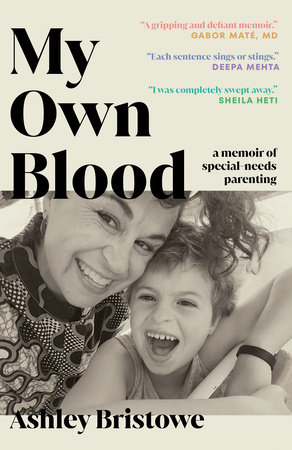June 21, 2023
My Own Blood: A Memoir of Special Needs Parenting, by Ashley Bristowe
“Anyone who claims that our society cares about people with special needs, families in crisis, mothers in general, or the exigencies of working parents can suck my strap-on. Individuals care, when there’s an inescapable or financial reason that makes it impossible not to. But society at large cares not a lick. I didn’t really know this before 2009.”
Ashley Bristowe’s memoir My Own Blood—just out in paperback—is a tough, brutal, emotional, excellent, impossible roller coaster of a read. I say “impossible” because I keep trying and failing to make sense of what was her reality for so many years (and continues to be in some ways), to tie her story in a tidy knot, and I can’t, which is fitting because my sense of impossibility about this story ain’t got nothing on what it must have been to live it.
When Bristowe’s second child is born in 2009 and diagnosed with a condition so rare that it doesn’t even have a proper name yet and only 76 other people had ever been diagnosed, her story diverges from the path she’d been expecting as her family grew—she and husband were freelancers, lived a creative and colourful life rich with travel and adventure. Frustrated by a lack of support for her son’s development in those crucial early years, and by continued entanglement in red tape and bureaucracy specially designed to keep families from accessing care and funding for which they’re eligible (and a medical system where authorities never admit to not knowing or having no answers, and instead are mostly fluent in the language of bullshit, which Bristowe is NOT HAVING), she finally finds the answers she’s looking for with a US establishment dedicating to fulfilling the potential of children with delays, disabilities, and brain injuries, whose officials believe it distinctly possible that, with years of intensive therapy, special diet, and more, that her son will be able to walk, to talk, to read—all those things that everyone has told Bristowe will never happen.
So in some ways this is a story of triumph, but in order to reach that triumph, Bristowe is forced to sacrifice everything—her career, her physical and mental health, many of her relationships, and general sense of well-being—to give her life over to Alexander’s treatments with a dedication that doesn’t always make sense to those around her. And so I’m not really sure that’s such a triumph after all—Bristowe writes so powerfully about her despair, her loneliness, her sense of absolute rage at systems that broke her and broke her again, but all the while she kept going, making clear that she’s an incredible force of a human, as well as an inspired and beautiful writer.
So was it worth it! YES! And NO! Because life isn’t tidy like that, is instead brutal, random, and totally unfair sometimes, where love and rage exist in equal measure (and there is so much love here). This is also a tricky book because as it rails against ableism and the low-expectations that our society has of the possibilities of disabled people’s lives (which conveniently correlates to how little we’re willing to invest in them), the idea of disability as something to be fixed is also something to trouble over, but I wonder if that’s just another way for some of us to pass the buck?






